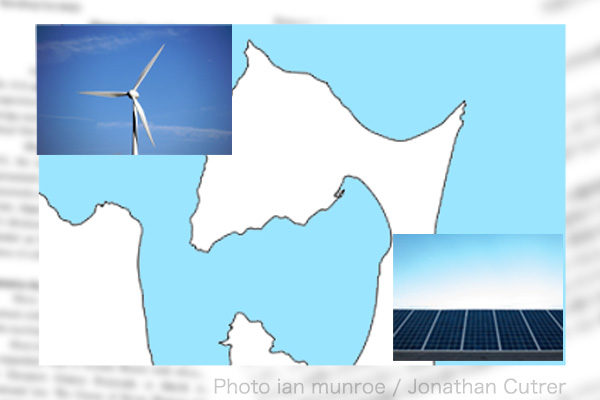Shanghai Electric Power Co., virtually controlled by the Chinese Communist Party, has won licenses for three wind power generation projects in Aomori Prefecture, northern Japan. In March, I visited sites in Mutsu City for two of the three sites.
One of the two sites is an open space neighboring an interim spent nuclear fuel storage facility in Sekine district of the city. Local residents were unaware that Shanghai Electric Power had got the license for the wind power project there. This may be because the land is owned by a Japanese citizen (according to registry) and the license for the project was given not to Shanghai Electric Power itself but to a limited liability company called SMW Tohoku.
At the other site that is 10 minutes away by car from the Ominato air base of the Japanese Maritime Self-Defense Force, the same limited liability company has obtained the license for wind power generation. The site is also owned by a Japanese citizen. Neither a fisheries cooperative nor a lumber shop close to the site had recognized Shanghai Electric Power’s undertaking of the project.
Shanghai Electric Power site neighboring a nuclear facility
SMW Tohoku is based at a Shanghai Electric Power office located in Marunouchi, Chiyoda-ku, Tokyo. A Chinese person named S applied for licenses for the wind power generation projects. Shanghai Electric Power has used the names of other limited liability and stock companies to get licenses for solar photovoltaics projects in Hyogo, Tochigi, Osaka, Fukushima, Ibaraki and Yamaguchi prefectures, as well as the wind farm projects in Aomori Prefecture.
The two projects in Mutsu City represent cases in which Shanghai Electric Power has obtained the right to use strategically important land under the beautiful name of green projects. Any sites within 1 kilometer from nuclear-related facilities or Self-Defense Forces bases are supposed to be subjected to an act on the use of land surrounding important facilities. The wind power generation project site in Mutsu City is on the opposite side of a road from the interim spent nuclear fuel storage facility and clearly subjected to the act. Can the site be regulated by the act? Regrettably, an official of the Cabinet Office in charge of the act said, “Transactions or the use of such land cannot be regulated unless harmful acts are conducted there.” The construction of wind and mega-solar power generation may fail to fall under harmful acts.
What is the purpose of the act, then? Japan allows even an adversarial country to use Japanese land under the General Agreement on Trade in Services (GATS) on the ground that international treaties override domestic laws. This virtually means that the Japanese government has abandoned a will to protect the assets and lives of its people.
Depending on foreign companies for key infrastructure is dangerous
First of all, any company controlled by the Chinese Communist Party should be excluded from renewable energy projects in Japan. From the viewpoint of territorial integrity, allowing an adversarial country to control islands, water sources, energy facilities or other infrastructure amounts to tolerating such country to get outposts for unarmed invasion when Japan’s relations with the country are strained.
Electricity and water represent a foundation of national power. Depending on foreign companies for domestic infrastructure weakens national power. While having nuclear and fossil fuel power generation technologies that can provide electricity stably at reasonable prices, Japan has introduced Chinese windmills and solar panels. Renewable energy power generation is vulnerable to unfavorable weather conditions and less efficient.
At nuclear power generation facilities in Aomori that have failed to operate due to delayed screening by the Nuclear Regulation Authority since the Great East Japan Earthquake, many workers were working hard towards uncertain dates for restarting the facilities. Nuclear energy technologies of which Japan boasts are still there. Is the government willing to allow China to encroach on Japanese land under the green policy that gives priority to globalism rather than the national economy? Political power is required now to prevent such situation.
Koko Kato is a member of the Planning Committee at the Japan Institute for National Fundamentals. She formerly served as Special Adviser to the Cabinet.


